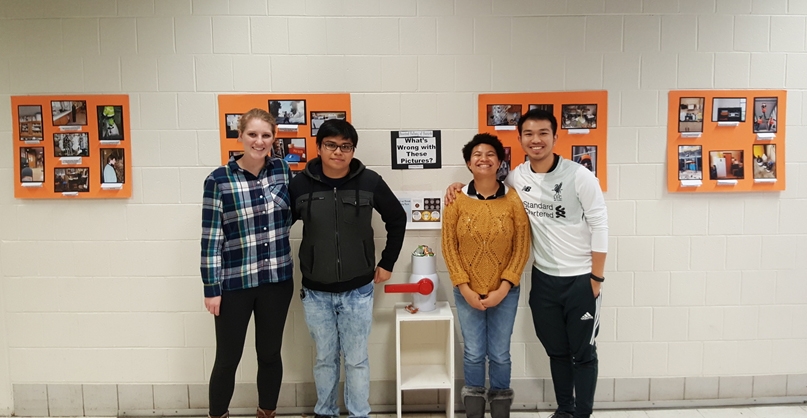
The Ralph E. Martin Department of Chemical Engineering is one of just 16 departments nationally recognized in a recent study by the American Chemical Society about academic laboratory safety teams.
The University of Arkansas and Texas A&M were the only Southeastern Conference schools noted in the study, which was published in ACS Chemical Health & Safety. The study outlines best practices for institutions to establish laboratory safety teams and features information from institutions including Johns Hopkins University, Yale University and Northwestern University.
The lab safety team was founded by Ph.D. student Jessica Morris and chemical engineering undergraduate student Austin Brown in 2016 as a student organization called the Engineering Safety Club.
Tammy Lutz-Rechtin is the department's safety coordinator and serves as a mentor to the student group alongside Tom Spicer, professor and the Maurice E. Barker Endowed Chair. Morris and Brown worked in Spicer's lab when the club was formed.
Lutz-Rechtin said the U of A club is an important way to embed safe habits early in a researcher's training.
"Chemical engineers are responsible for many manufacturing scale-up processes where small problems in a lab have the potential to become large scale problems when applied to industry production," she said. "Starting good habits early is important, as well as providing opportunities for hands-on learning. We want to be proactive and not wait until issues arrive as well as teach critical thinking skills. Good engineering and research should be inherently safe."
The club was led through the 2019-20 academic year by Ashley Cox, a senior in the Ralph E. Martin Department of Chemical Engineering. Cox said safety is about more than just wearing protective gear.
"I feel like when people think about safety, they normally envision PPE such as goggles and gloves but safety is much more than that," Cox said. "Good safety centers around a hierarchy of controls. The hierarchy of controls in order of most effective to least effective is: eliminating hazards; substituting hazards; utilizing engineering controls to protect people from hazards; administrative controls to change how people work around hazards; and personal protective equipment.
"When students work in labs, the best way to be safe is to create an environment with the fewest possible hazards and to safely control hazards that cannot be eliminated."
David Ford, department head and Kevin W. and Marie L. Brown Department Head Chair in Chemical Engineering, said inclusion in the study is an indicator the university's chemical engineering research program is a national leader.
"There are many necessary elements in a premier academic research program, and in chemical engineering, one of them is a strong safety culture," he said. "Our active participation in a nationwide network of laboratory safety teams in chemistry and chemical engineering helps us to strengthen that culture. Inclusion in this study is also a recognition that the U of A is a peer of elite research universities in this important area."
Ford said the focus on lab safety will be more important than ever as researchers navigate the world of research amid the COVID-19 pandemic.
"As a department head, the worst thing that could happen on my watch is for someone to get seriously hurt," he said. "The research that we do is important, but it's not worth someone's life or health. We've got to move ahead, but do so safely. COVID-19 is going to pose a lot of challenges to laboratory research. Some of the tenets of COVID-19 safety, like an isolated work environment, are counter to tenets of lab safety, like never work in the lab alone. We will rely on Dr. Lutz-Rechtin and her network of professionals to guide us to a new set of best practices."
Cox said she hopes the team's participation in the ACS study will help improve lab safety around the country.
"Our hope from participating in this study is to help create and become involved in a nationwide network of laboratory safety organizations," she said. "The study has allowed for the creation of a listserv that includes the 16 teams from the paper. I'm hopeful that by using the listserv and creating a network with our organizations, we can conduct collaborative events and begin expanding our group's outreach beyond the chemical engineering department here at the U of A."
Topics
Contacts
Nick DeMoss, director of communications
College of Engineering
479-575-5697,